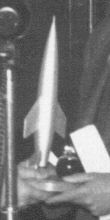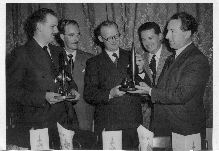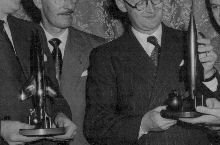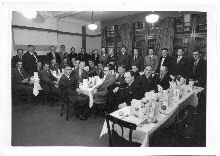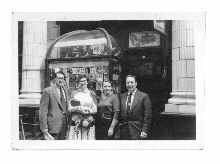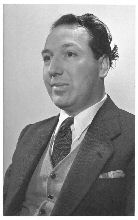Updated April 2025
The INTERNATIONAL FANTASY AWARD
An IFA rocket held by G Ken Chapman
The IFA was a British award for excellence within the sf/fantasy field; a precursor of the Hugo Award by two years, it was originally devised and promoted by John Wyndham, Frank Cooper, G Ken Chapman and Leslie Flood. For good overviews of the beginnings and history of the IFA see CONVENTION REPORT, A MERIT FOR FANTASY and this 1963 fanzine article.
The first awards were made at the British annual convention of 1951- variously called the FIRST INTERNATIONAL SCIENCE FICTION CONVENTION, THE FESTIVAL CONVENTION, THE SCIENCE FICTION FESTIVAL CONVENTION, or more lastingly the FESTIVENTION, held over May 10-14 1951 in London and named after the then-current Festival of Britain.
The awards were made on the decision of a panel of selected experts in the field - as is the case with most modern literary prizes - not by a popular vote as is the case with the US-originated Hugo awards which were first presented in 1953.
The award continued - never really embedded into the British sf culture - until 1957. The last winner was JRR Tolkien, for LORD OF THE RINGS, and the award was presented at a special meeting of the SF Luncheon Club held during the period of the 1957 London World SF Convention. The presentation was not open to the general membership of the convention. Tolkien did briefly attend but was not impressed and did not linger.
It is said that the IFA was never designed to be a 'popular' award, in the sense that it was the judgement of the masses that counted, and while there is a lot to be said in favour of the 'informed expert committee' approach one wonders with hindsight whether that did not in fact lead to the award's demise, as there seems to have been little popular support or even interest in it from the general population of British fandom or the wider sf-reading community. The fact that the awards were presented at closed invitation-only events may well have alienated many science-fiction enthusiasts of the day. See here - a short piece by Rob Hansen on the 1953 IFA presentation
NEW WORLDS was pretty much the house magazine of the IFA, mainly due to the involvement of both Leslie Flood and John Carnell in both ventures. Several reports - written by Flood - of the IFA judging and results were published, as well as some other related comment in Carnell's editorials. There was surprisingly (or not surprisingly, see remarks above) very little written about the IFA in the fanzines or professional magazines of the day other than NEW WORLDS, although there were some pieces in fanzines devoted to sf-related news. Actual written commentary on the IFA by sf fans in fanzines seems quite uncommon.
1951, 1952, 1953, 1954, 1955, 1956, 1957
MISCELLANY IFA ACCOUNTS and other related stuff
All useful material found has been put into pages by year, either according to the year it refers to or occasionally the year of publication. There are some interesting comments and historical overviews in MISCELLANY
SEE ALSO FANCYCLOPEDIA 3 and Wikipedia, the SFE, another webpage discussing the IFA, and the ISFDB
More information, commentary and anecdote about the IFA is always wanted - contact me here
Forrest J Ackerman receives the award on behalf of George R Stewart from G Ken Chapman
An example of the IFA. This is often confused with early version of the Hugo award, and occasionally early Hugo rocketships are shown as IFA awards.
Arthur C Clarke receives the award for
EXPLORATION OF SPACE.
L-R - Frank Cooper ??, John Carnell,
Clarke, Ken Chapmen, Leslie Flood
Leslie Flood at head of table (Bob Monkhouse and Denis Goodwin - guests between Sam Youd/John Christopher and Ken Chapman, standing at left.)
Fantasy Center, Sicilian Avenue, London, 1957. Brian Aldiss at left. Identification of the two women would be much appreciated.
Les Flood
Leslie Flood in his Sicilian Avenue bookshop, Fantasy Centre, an important place for the British sf community of the Fifties and Sixties. It was also a record shop!
IFA Winners - only 1951-1953 had both fiction and non-fiction awards.
1951: Earth Abides - George
R. Stewart
The Conquest of Space - Willy Ley
and Chesley Bonestell
1952: Fancies And Goodnights
- John Collier
The Exploration of Space - Arthur C
Clarke
1953: City - Clifford D
Simak
Lands Beyond - L Sprague De Camp and
Willy Ley
1954: More Than Human - Theodore Sturgeon
1955: A Mirror for Observers - Edgar Pangborn
(1956: THE DRAGON IN THE SEA - Frank Herbert - see 1956)
1957: Lord of the Rings - J. R. R. Tolkien
(See also here, a document which includes information on runners-up)
_tm.jpg)

